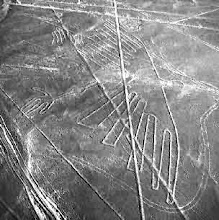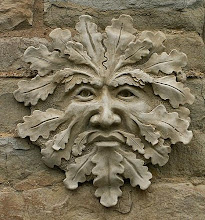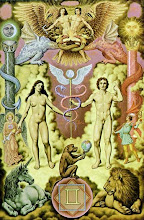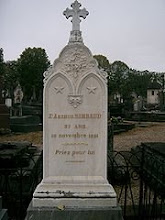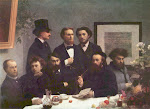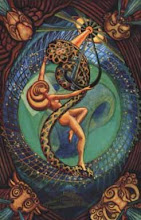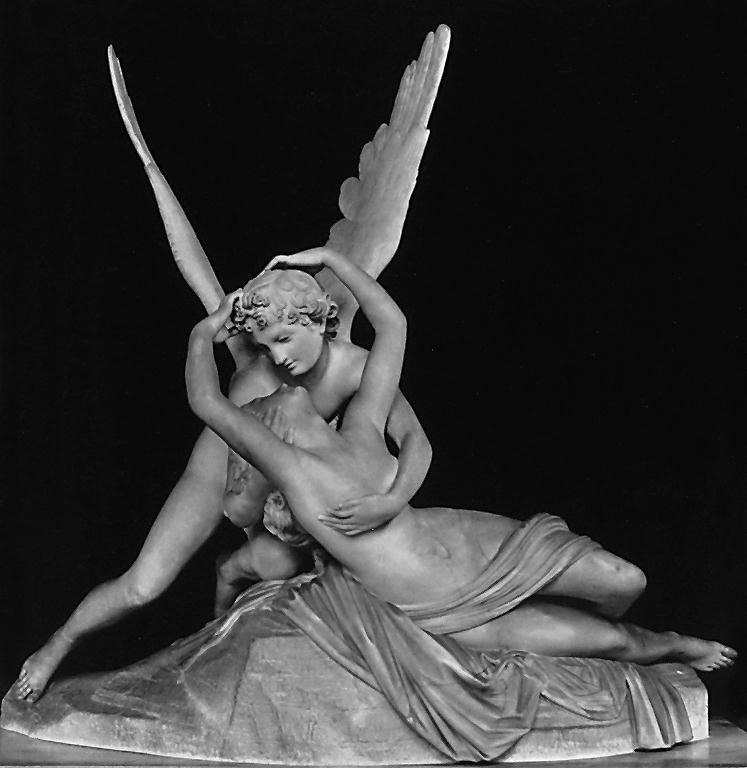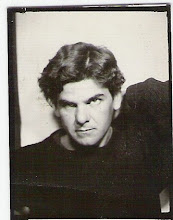 |
| Temple of Janus at Autun (Augustodunum), France. | | |
|
I
Once more, a vision of my
past comes streaming in
As the New Year approaches,
as it beckons me
To go within
And deeply reflect
On where I have been and
where I aspire to go.
Like honey, a memory pours into my mind, almost palpable:
I see a young man looking up into the sky,
One scoured clean by rain
from the previous day's storm,
Yet one no longer of solid
gray but now of coruscating silver,
Of thin blue streaks shot
through with glorious arrows of sunlight
That pour down upon the Oakland-Berkeley hills, newly verdant.
It is as if a new Heaven and Earth were born.
He drinks in this vault like a cup of blessing,
It is New Year's Day,
sometime around 1983 or '84.
He is suspended by the
beauty of this silvery cup of sky,
Arrested so deeply that he is driven to begin a poem that day
To this New Year and
hopefully many more after it;
A vision long unrealized for
decades to come,
Yet it was then that the seed of inspiration
For this cycle of poems was sown.
***************
With the image of this memory still within me,
I look through a window, my reflection superimposed on it.
Janus-headed, I look toward the future...
Playing with rhymes
Of words and times that I now yet know,
Wrestling with the verses of tomorrow's poem
From yesterday's unfinished lines
I work to find the next rhyme of aim and purpose in time
And dream better dreams of the poem to come
Before my days at last depart.
Janus-headed, I stare through my reflection back into my past
The poem fans out behind me in waves like an echoing wake,
Mantling to exhaustion, dilating back into the sea; A furrow flowing back 40 years from this recollection,
And another 21 years more behind it,
Much of it a turbulent journey
Marked by probably more failure than success,
Many times crucified and many times resurrected.
Yet, what is behind me and whatever is before me
Pale beside what is within me.
To That I move closer.
I depart from this
musing.
It is late.
My eyes are heavy from several hours of reading
And subsequent writing on the Roman god, Janus,
Probing many sources trying to track down his origins,
Attempting to uncover the earliest
vestiges of his worship,
But not finding any knowledge
to my real satisfaction,
Because, truly, virtually
nothing is known of these things.
I lay my head to
sleep.
Images of Janus and the pre-Roman world he came from
Wash languidly through my mind.
Thoughts of the portending
New Year, merely two days away,
Also circle as I begin
to enter a light trance.
I seem to sway in time upon
my bed:
The past begins to merge with
the present, and the present
Risks into the future,
come whatever may next year.
II
From my pillow,
Scenes before my mind's
eye flicker.
At the entrance to slumber
I am swept up by the oceanic
current of time,
Led back, far, far back into
it,
Captured in the vortex of a
great undertow
Where my vision and
imagination spin and weave
In the threading currents of
this deep and vast ocean
Of imagination, vision, and
dream that flows within.
There all at once,
aback,
I see in my mind's eye
A landscape
stretching before me
Of sprawling hills bestrewn with tall, thick woods.
Rustic hamlets speckle their
crests, slopes, and bases.
I see vague human figures crisscross
These hills, valleys, and plains,
Moving in the ancient toil and moil of their daily labor.
The vision swirls
And no scene remains static
for long.
They are like shards of the
primeval pottery of this land-
A burnished ware incised with
spirals, meanders
And geometrical zones filled
with dots or transverse dashes.
I hold in my mind's eye
These shards and tiny fragments of the
amphorae of time
Whose essence fills the
broken cups of history;
An essence of timelessness often beyond all record or
memory
That pours like wine.

III
In a lightning flash
I am in the
Alban Hills of Central Italy.
Standing atop Mons Albanus,
their highest point,
I am lifted inside a
brilliant sunset 3,100 feet into the air
And able to see for 70 miles
in any direction.
I stand overlooking Latium1 and view large tracts
Of Etruria and Umbria beside it.
Arising out of volcanic soil, the hard leaves
Of the trees and shrubs of this land
Survive long periods of dryness and heat.
Some places are sere and rocky scrabble
Yet many slopes and valleys are starred
With oaks, pines, myrtles, junipers, and laurels
And the plains bear wheat and other grains.
To the northwest, just eight miles
away, lay seven green hills.
There the Eternal City of Rome will someday
stand;
A vast alluvial plain surrounding it
Ringed in hills and mountains.
I see Rome as it was before
Romulus and Remus.
I see it as it was even
before Aeneas arrived.
I see the ancient town of
Laurentium that
greeted the Trojan,
The first settlement
of Latium built by the Aborigines;
A semi-mythological people
whom the Romans said
Came down from the heights of the Apennines
To become
the earliest recorded stock of Latium.
I see, too, the colonies of
the Pelasgians, proto-Hellenes
Who arrived from Arcadia and mingled with these
Aborigines
At the dawn of the Iron Age
or before.
All of these scenes are like
the facets of a spinning jewel,
And I see them almost
simultaneously
In a matter of mere flashing
seconds.
They are a blur of human figures on an obscure landscape
Moving rapidly further and further into the past.
IV
In this trance that borders
sleep, my imagination
Visits a world well over 500
years before
The founding of Rome in 753
BC.,
Yet even now I can see
villages atop each of its hills.
I see that Rome was inhabited
before it even had a name.
I glimpse Evander, son of Apollo and Carmenta, a nymph.
From Arcadia on the Greek
Peloponnesus he came
Sixty years before the Trojan
war, bringing with him to Italy
The Greek pantheon, laws, and
alphabet
Some 3300 or more years ago.
Around him gather a group of native Latins
Of Aborigine stock, themselves recent to this land.
Together they will found the town of Pallantium
On Pallantine Hill, the first known habitation of Rome.
I see, too, the Great Altar
of Hercules that he built
At the docks of the town, in
what came to be known
As the Forum Boarium, where
Aeneas and his crew
First came upon Evander and
his people
While venerating Hercules for
dispatching Cacus;
A fire-breathing giant who
lived on human flesh
And nailed the heads of his
victims to the doors
Of his cave on Aventine Hill,
the southernmost of Rome.
I see those grim doors and
the bloody heads fixed upon them.
****************
Scenes unfold in a shuffling
of images,
I am in a deep reverie; part
imagination, part dream,
Half-conscious,
half-asleep.
In hypnogogia, this hallucinatory vision
has come unbidden
And arrives in swift
pulses
Like lightning streaks that
fork and spiral.
I see twelve miles away a
sea rolling to shore
In gorgeous waves that have journeyed far.
Their foamy paths consume the beach.
It is the Tyhrrenean sea;
Tyrhrrenean, the name
The ancient Greeks gave to
the Etruscans
With whom they traded their
fine pottery, cloth, and wine
In exchange for lead, tin,
copper, silver, and especially
iron,
For the Etruscans were skilled miners and so, quite wealthy.
But commerce was hard. There were many trials and dangers
In the journey made to join in trade.
It was in this sea that the
Greeks believed
Aeolia dwelt; a cloud-ringed,
floating island of tall, sheer cliffs
With walls of unbreakable
bronze surrounding it.
It was here that Aeolus, King of the Winds, resided.
Within the caves of Aeolia's cliffs he enchained his winds,
And with his wife and six sons
and six daughters-
Daughters whom he gave to his
sons as wives-
He lived blissfully on this idyllic, fabled island
Alleged to be just north of the eastern tip of Sicily
Beside the toe of Italy; a narrow channel of rough winds.
Here, many a sailor vanished into the sea
I see these winds blow through everything.
**************
My vision shifts.
Directly
below me,
Near the base of Mons Albanus,
I see a river;
The Tiber, pouring down
4,200 feet
From its fountainhead in the
Apennine mountains.
I watch the last 25 miles of
its sea-bound journey
As it swirls past the embankment of
Where Rome, Caput Mundi, will come to receive its nourishment.
Twisting through scenic
gorges and broad, fertile valleys,
A muscular male god flows
stoutly within it.
He reclines the large, watery sinews
of his body
Along its 250 mile course to
the Tyhrennean sea.
He is Tiberinus, the son of
Janus and Camasene,
A local nymph, and Janus'
sister and spouse.
He will tell Aeneas to travel
further up his body
And find the Latins. They
will help him
After his six years of
wandering the Mediterranean.
From Aeneas' bloodline Rome will flow, consanguineous
With the Tiber and its spirit.
 |
| Tiberinus |
 |
| Culsans |
;
V
I gaze 50 miles further north.
Thither my vision wings and like a kestrel I see
The unbroken, primeval Ciminian Forest;
A rolling, pathless wilderness of dense oak and beech In which few dared tread
For fear of wild beasts and dark spirits,
Its high and broad mass separating Latium from Etruria.
I gaze as far as I can to see over the forest.
I behold then, in just a flash, on the other side
An open air shrine, and within, a bronze statuette
Of Culsans, Etruscan god of Doorways and Gates:
Tutelary of the entrance to Etruscan towns
And, too, a male god of conception.
He is a beardless youth, nude
But for a pair of rustic boots and a cap,
Sculpted contrapposto2, with one hand on his hip.
His defining physical characteristic:
Two faces looking in opposite directions.
Indubitably, Janus burgeoned from him;
But one of many influences embedded in Rome
By the enigmatic and deeply superstitious Etruscans
Who were instrumental to the establishment of the city3.
I see swirling around Culsans' flexible body
Innumerable soothsayers of stars, birds, entrails, placentas,
Lightning, winds, dust, burning coals, and smoke,
Even those of the songs of frogs and the webs of spiders,
But most of all, I see the interpreters of dreams.
The image of Culsans goes rifling past my eyes like a dream,
And I as soon see him as he is gone.
**************
I see now a collection of antique idols of the di indigetes;
Uniquely Roman deities with little or no Greek equivalent.
In every home a small cupboard contained their
images
And a portion of each meal was thrown into the hearth
To honor and worship them.
They were potent divinities of the earliest provenance,
Ancient beyond words.4.
I see a modest, little domus5, its occupants outside at work,
And gaze into their cupboard shrine near a hearth.
I see small, clay statuettes of these gods and goddesses.
Animistic in character and domestic in function,
These gods ruled the microcosm
Of the Roman domus and insula:
Vesta, a flame: spirit of the hearth, home, family, and state;
Penates: guardians of the pantry and keepers of body and soul;
Lares Familiaris: protectors of the family fortune and its lands;
Di Manes6: ancestral deities offered blood for the souls
Of deceased loved ones with whom they now resided;
And lastly, Janus: custodian of the doorway
And god of all beginnings and transitions.
It is he who draws my primary focus.
The first god named in any prayer,
Before even that of Jupiter,
And likely the most important god
In the archaic pantheon of Rome,
Almost all of these gods now lost to time.
 |
| Janus |
VI
Between dreams and reality
Between abstract entities and actualized goals
Between space and space, time and time
Between order and chaos, at their point of division,
And between each point of ending and each point of renewal
Janus was
the intercessor,
Presiding over all beginnings and transitions
And thereat, was invoked for his blessing
At every new journey and passage of life.
Holder of the key to all doors and gateways,
Omnipresent at every threshold and boundary,
He conducted men, women, and children in their movement
From what
was to what was to become.
Old as time itself,
Veritably, a god present at the beginning of creation
Yet not the Creator.
Rather, a custodian of existence
Who with his ring of many keys unlocked
The doors that preceded ingress and egress of All Motion,
Yet was not its life force,
Merely its porter and superintendent,
A janitor8, if you will, who opened the doors of morning
And swept clear the way for all who prayed to him
At time of conception, birth, marriage,
And every important passage and journey
On the road of life to death;
Itself a new beginning, a new journey, a new door.
This vision culminates here.
I finally slip off into sleep,
A nightly passage into dreams, deep sleep-
The Primordial-
And back into dreams and waking
In a vast circuit of passages
All guided in their return to The Primordial
By the ancient divinities who are always with us.
Hail the Ancient Ones! Hail Janus! Hail All Divinity!
VII
New Year's Eve day has arrived, hail!
The last day of 2022, hail!
I open my eyes, permeated by the energy
Of a new doorway leading to a new horizon.
I meditate, then face the world.
I take in the news- many bad actors at play.
I remain as free and apart from them as I can,
Guarding my equanimity, centered in calm discrimination.
Consider this a public
diary of the year,
An Annales Maximi; the chronicles kept of key public events
By the Pontifex Maximus of Jupiter Optimus Maximus,
Highest religious official of Rome.
I make no claims to priestly authority.
**************
This is where important matters now stand in the world
As of the last day of 2022.
It is not events I chronicleBut certain political actors
That strive for power and domination,
For tyrannical overreach.
I forego a long description and dissection of them.
Lakes of ink have been used up
Analyzing these venal actors already.
There is no need to spill more.











